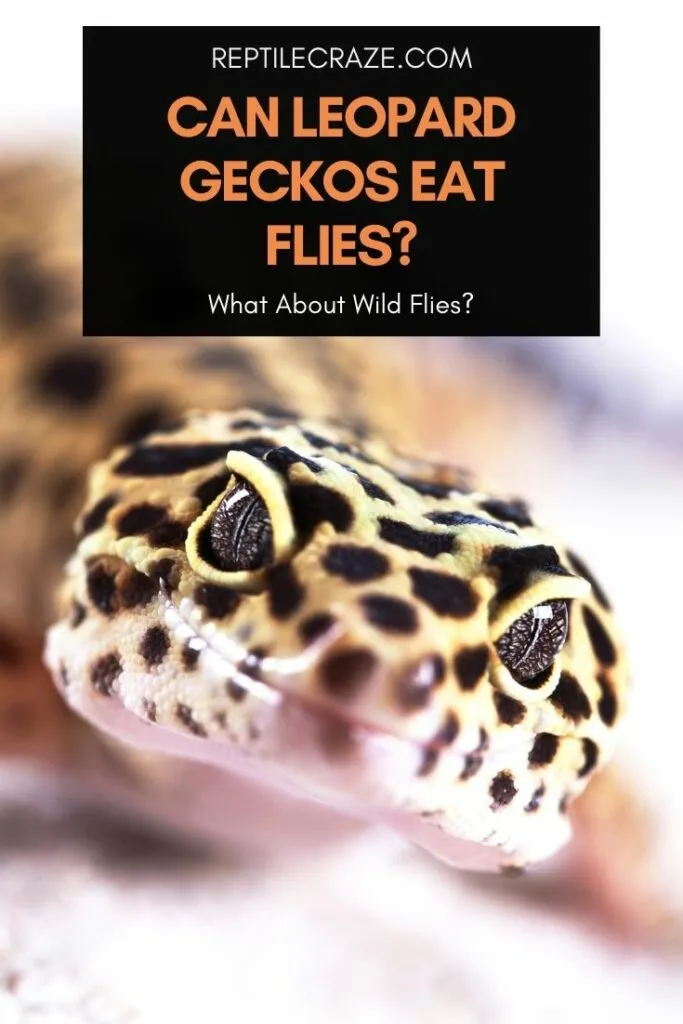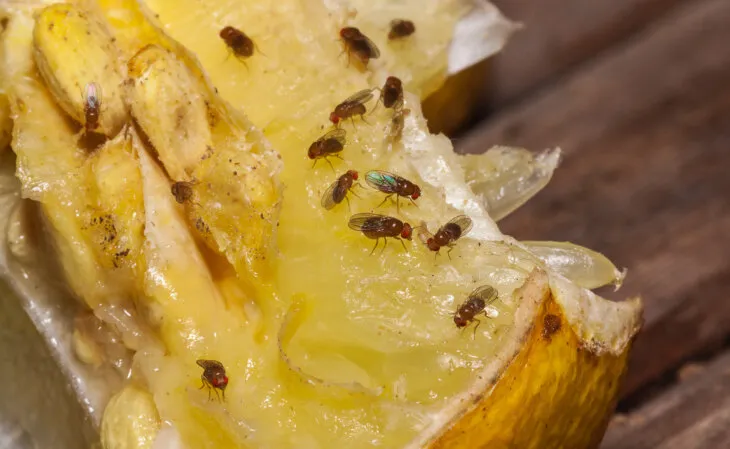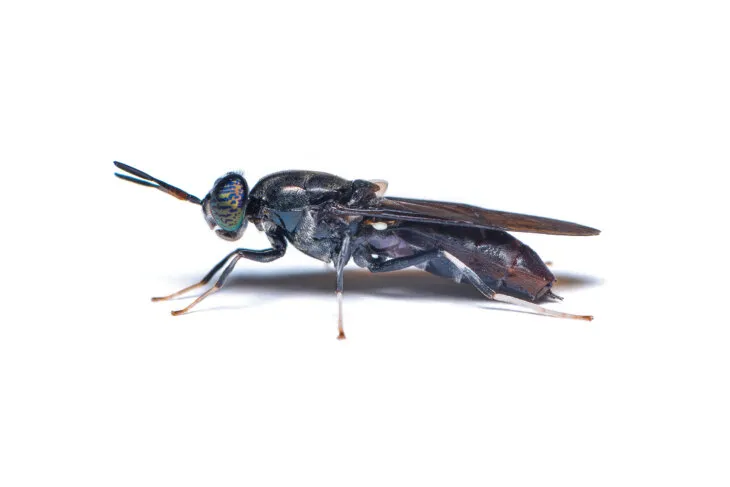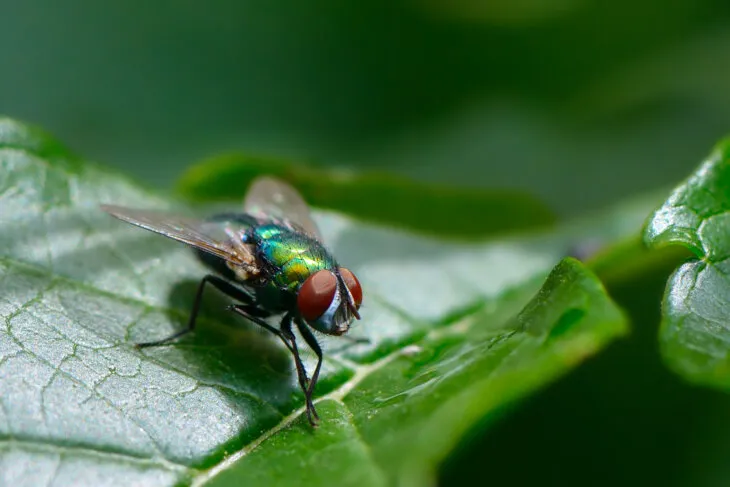
As a leopard gecko owner, you undoubtedly want the best for your little friend. Crickets and mealworms are excellent choices for many reptiles, but could other insects add more variety, excitement, and nutrition to your gecko’s diet? Flies, for example?
Leopard geckos can eat flies! In the wild, geckos will eat any available insect, and flies are no exception. For captive leopard geckos, flies can stimulate hunting behavior and extra activity in addition to being a nutritious snack.
With so many options out there, how will you know which flies to choose? Well, look no further! Keep reading for details on which flies are good for leopard geckos, insect nutrition, and how to cultivate your own feeders!
Table of Contents
Which flies can leopard geckos eat?
Leopard geckos can eat a variety of flies and their larvae:
- Black soldier fly larvae and adults
- Blue bottle fly larvae and adults
- House fly larvae and adults
These guys are packed with nutrients and are a perfect size for an adult leopard gecko! Purchasing fly larvae can have the added benefit of variety – for example, black soldier fly larvae can be fed in the larval, pupa, and adult stages! Talk about bang for your buck!
Can leopard geckos eat fruit flies?
Fruit flies can be an easily obtained staple

In my research, some bloggers advocate for feeding fruit flies to hatchling geckos as an excellent source of nutrition. However, many users of reptile discussion forums such as Geckos Unlimited and the Leopard Geckos Subreddit seem to disagree.
The consensus of savvy reptile owners is that geckos, even hatchlings, show no interest in fruit flies and don’t exactly recognize them as something to eat. We’ve experienced the same thing!
In fact, I’ve read several complaints about fruit flies growing as pests inside an enclosure! This is a headache you’ll want to avoid, so feeding fruit flies (even the flightless feeder variety) isn’t recommended.
Can leopard geckos eat black soldier flies?

Your gecko can eat the adult flies, but there’s a catch – there is a large volume of research on the nutritional value and digestibility of the larvae in leopard geckos and very little information to be found concerning the adult fly.
To be on the safe side, it’s more beneficial to feed the BSF larvae, as research shows they’re a great source of nutrition for your leopard gecko. Feed the adult flies as treats every once in a while to spice things up!
Larval black soldier flies go by many other names, such as Phoenix Worms or Nutrigrubs. They are sometimes considered a gecko superfood for their high phosphorous and calcium content and great digestibility!
Here’s a nutritional breakdown of BSF larvae:
| Nutrient | Content |
| Protein | 17.5% |
| Fat | 10-14% |
| Calcium | 9340 mg/kg |
| Phosphorous | 3560 mg/kg |
| Fiber | 3% |
| Moisture | 61.2% |
There can be additional benefits to allowing your BSF larvae to pupate – a study has shown that the calcium, phosphorous, and protein content are increased in the pre-pupa and pupa stage as compared to the larval stage:
| Life Stage | Calcium | Phosphorous | Protein (%) |
| Mature Larva | 2900mg/100g | 350mg/100g | 38.6% |
| Pupa | 3000mg/100g | 620mg/100g | 46.2% |
If you happen to leave some pupa until the adult stage, they’re still okay to eat. Though the adult black soldier flies may look a bit frightening, they’re harmless – and tasty!
How to store BSFL
These larvae should be stored at room temperature (or slightly cooler) but should never be refrigerated. If you’ve stored these guys in a cool place, be sure to warm them up before feeding them to your gecko.
Additionally, black soldier flies have a relatively short life cycle (18 days at the larval stage), so the container you store them in will need a lid to prevent adult flies from escaping.
Check out our article on black soldier fly larvae and leopard geckos for more information!
Can leopard geckos eat house flies?

Your leopard gecko can eat house flies! However, these are not as common of a feeder insect as others on this list, so they may be more difficult to come by. If you can get your hands on these little bugs, they can provide excellent enrichment!
House flies and blue bottle flies can be purchased in their larval stages and fed to your leopard gecko as larvae, pupa, or adults.
If allowed to pupate and form into an adult fly, it’s recommended to put the flies in the fridge to slow them down, giving your leopard gecko a competitive edge to catch their lunch.
Unlike the other flies on this list, house fly and blue bottle fly larvae should be refrigerated!
Are flies nutritious compared to standard feeder insects?
In my research, the nutritional value of these adult flies is not readily available, so feeding too many of them to your gecko could cause unwanted problems with imbalances in nutrition like obesity or metabolic bone disease.
If you want to feed your leopard gecko adult flies, keep them as a treat or exciting environmental enrichment. For the bulk of their diet, it’s best to stick to fly larvae or other standard feeder insects with known nutrient compositions.
The most common feeder fly larvae – the black soldier fly larvae – contains a much higher level of calcium and phosphorous than standard feeder insects like crickets and mealworms! Check out the table below to see how they stack up:
| Species | Protein (%) | Fat (%) | Calcium (mg/kg) | Phosphorous (mg/kg) |
| Crickets | 15.4 | 3.3 | 275 | 2520 |
| Mealworms | 18.7 | 13.4 | 169 | 2950 |
| Black Soldier Fly Larvae | 17.5 | 14 | 9340 | 3560 |
No matter what mix of insects you’re feeding, it’s essential to ensure proper nutrition for your gecko via gut loading feeders and dusting with supplements appropriately.
How many flies should a leopard gecko eat per day?
How much to feed your gecko depends on several factors:
- The size of your gecko
- The age of your gecko
- The size of the insect
It’s generally recommended that a leopard gecko consume two insects per inch of body length. For an adult leopard gecko, this is usually 5-10 large insects every other day.
Insects should be no larger than the space between your gecko’s eyes (the size of their esophagus) to prevent impaction – a life-threatening condition.
So, how does that translate? Here’s a handy table demonstrating how many BSF larvae or adult flies to feed your gecko:
| Age | Number of BSF Larvae/Adults | Number of House/Blue Bottle Fly Adults |
| Young Leopard Geckos (0 to 4 months) | 4 to 10 BSF larvae (¼ inches) – per day | 4 to 10 House flies (¼ inch) – per day |
| Juvenile Leopard Geckos (4 to 10 months) | 5 to 10 BSF larvae (½ inches) – 5 to 6 days a week | 5 to 10 Blue Bottle Flies (½ inches) – 5 to 6 days a week |
| Mature Leopard Geckos (10 and more months) | 5 to 15 BSF adults (¾ inches) – 2 to 3 times a week | 5 to 15 Blue Bottle Flies (½ inches) – 2 to 3 times a week |
In addition to flies or fly larvae, it is best to provide your gecko with a variety of insects as opposed to only one type for a complete nutrient profile. The Merck Veterinary Manual recommends reptiles have at least two sources of nutrition.
Can you feed your leopard gecko dead flies?
No – you should never feed your gecko dead insects. Dead or dried insects do not contain the nutrition and moisture your leopard gecko needs, and because they are dried out, they may be difficult to digest (source).
In addition to the nutritional issues, geckos aren’t keen on eating insects that aren’t alive and moving. But as you’ve seen in this article, live feeder insects like fly larvae are easy to keep and purchase.
If you’re cultivating feeder insects at home, always remember to clean out your tanks or containers to remove dead insects and the pesky mites that may feed on them!
Can geckos eat wild flies?
Technically, they can, but it’s not a good idea to feed wild insects to your pet due to the risk of parasites, toxicity, and pesticide contamination.
Flies can be exposed to harmful chemicals like fertilizers and pesticides in the environment, and while these pesticides may be safe in small amounts for wild mammals and birds, studies show they can be dangerous for reptiles.
Other wild insects can also be harmful to your gecko. Bioluminescent bugs, for example, are very toxic to reptiles.
If you’re rounding up flies from your garden, bugs caught up in your nets (like bees or ants) will have to be plucked out before feeding to your gecko, as insects like these can bite or sting them.
Can wild flies carry parasites?
Parasites are another reason not to feed your leopard gecko wild-caught flies! Wild insects can be vectors for bacteria and parasites; this means the insect harbors the infection or parasite and can then transfer it to another host through bites or ingestion.
- Enchi Ball Python: A Unique and Stunning Morph of Python regius - March 27, 2025
- Emerald Tree Monitor: The Enigmatic Green Guardian of the Rainforest - March 26, 2025
- The Egyptian Cobra (Naja haje): A Fascinating Serpent - March 25, 2025
